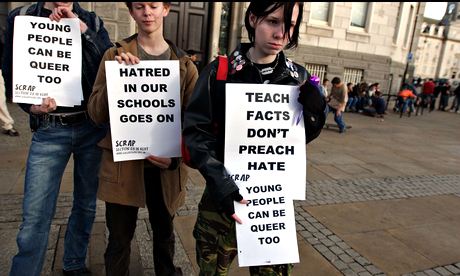
In the early 1980s, a picture book called Jenny Lives with Eric and Martin by a Danish writer called Susanne Bösche was published in the UK. A few years later, this book found itself at the centre of a political storm.
Margaret Thatcher was in power at the time, and it seemed her government didn't take kindly to a book aimed at very young children about a girl visiting her dad and his male partner. And so, to cut a long story short, a law known as "Section 28" came into effect. This law banned schools and local governments from 'promoting homosexuality'. Actually, the one concession that they made was to insert the word 'intentionally'. So in fact, you could still promote homosexuality, but only if you did it by accident. Obviously, this was a very difficult law to prove, and, as far as I know, not a single case was ever brought to court. But what this law did – and why it was so insidious and so dangerous – was to make people worry about whether they might be breaking the law. And so, just to be on the safe side, people stopped themselves from doing anything that might be illegal, before anyone else could. Teachers censored their lessons. Librarians changed their book-buying decisions. All sorts of people who worked with young people worried about whether they were breaking the law if they supported a young person who might have been desperately in need of discussing their own sexuality. A climate of fear, paranoia and censorship kept many LGBT books away from young people. It was during the era of Section 28 that I wrote my first novel, Read Me Like A Book. This was a novel about a 17-year-old girl coming out. It was rejected at that time, and went in a drawer where it lived for almost fifteen years. Along with, I imagine, LGBT-themed books by many other writers.
But then things changed. Gradually. Quietly. In 2003, with very little fanfare and hardly any news coverage, Section 28 was repealed. (Incidentally, as a contrast to this, you really should check out this video to see what happened with the news coverage on the night that Section 28 passed into law 15 years earlier. It is probably my favourite ever live TV moment, and the words "We have rather been invaded" still make me laugh.)
Now that lesbian and gay people were no longer legally defined as second-class citizens, the world started to look different. And feel different. At least in the UK. Let's not get started on the current political situation in Russia, for example, where Putin is doing a very impressive Thatcher impersonation with the recent anti-gay laws over there. In fact, it is a sign of the times that there are now so many LGBT books either published or due to be published that the Guardian is running this brilliant LGBT week. A move like this would have been UNHEARD OF twenty years ago. Even ten years ago. And so, in this changing climate, a few months ago I decided to approach my publisher with my YA book again. This time the response was swift. "Times have changed, and we are ready to move with them" said my lovely publisher. In fact, times have changed so much that by the time my book comes out next spring, it will be one of many, many books dealing with similar themes and ideas. These are exciting times, and I am so proud to look around and see all the books that are now being written – and published – for young people on issues that really matter to them. And I'm even prouder that, after fifteen years in a drawer, my own contribution to this movement is finally coming out.

